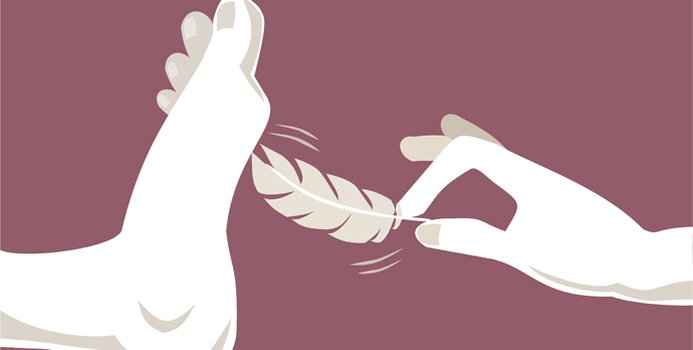Few people enjoy being tickled. Some ticklees may like being tickled — up until the point when they realize they’ve lost all control. And for the very ticklish among us, the involuntary spasms and forced laughter make being tickled nothing short of terrifying.
Whether or not you’re a fan of tickling, here’s a brief explanation of what makes us ticklish in the first place — and how to (possibly) overcome it.
There are two types of tickling. Knismesis is the tingling, itchy sensation that you get when a bug lands on your skin or you get a shock. On the other hand, gargalesis is what happens when you’re being tickled — that laughing, squirming, gasping-for-air sensation. Some zones — such as the feet, neck, ribs, armpits, or inner thighs — are more vulnerable than others.
Some primates, such as gorillas, also laugh when tickled. Like most behaviors, gargalesis might have an evolutionary explanation.
Functional magnetic resonance image studies (fMRI) provide a few clues. The Rolandic Operculum is the area of the brain that controls vocal and emotional reactions, as well as facial movements. According to one fMRI study, this area of the brain lights up both when we’re laughing at being tickled and when we’re laughing at a funny joke.
Interestingly, the laughter caused by tickling also activates the hypothalamus, the area of the brain in charge of our fight or flight response. The hypothalamus is active when you’re anticipating something painful.
So, laughing while being tickled might be a defence mechanism. Laughter could be a way of indicating submission to the perceived aggressor — an attempt to dispel tension, reduce the length of the attack, and prevent injury. Meanwhile, squirming helps to redirect the tickler’s hands away from those sensitive zones.
Can we actually control how ticklish we are? In extremely ticklish people, even a light touch can cause gargalesis. In the end, researchers believe that much of tickling is psychological. In other words, if you can persuade yourself that you don’t feel it, you might not feel it.
But mind over matter is always easier said than done. The next time you experience a tickle attack, close your eyes. Try to focus on something other than the tickle — focus on a strong memory or feeling.
If your ticklishness is getting in the way of intimacy with a romantic partner, try asking them to let you place your hand over theirs as they touch you. This can help you feel like you’re in control — after all, we can’t tickle ourselves.
[Image via Shutterstock]



